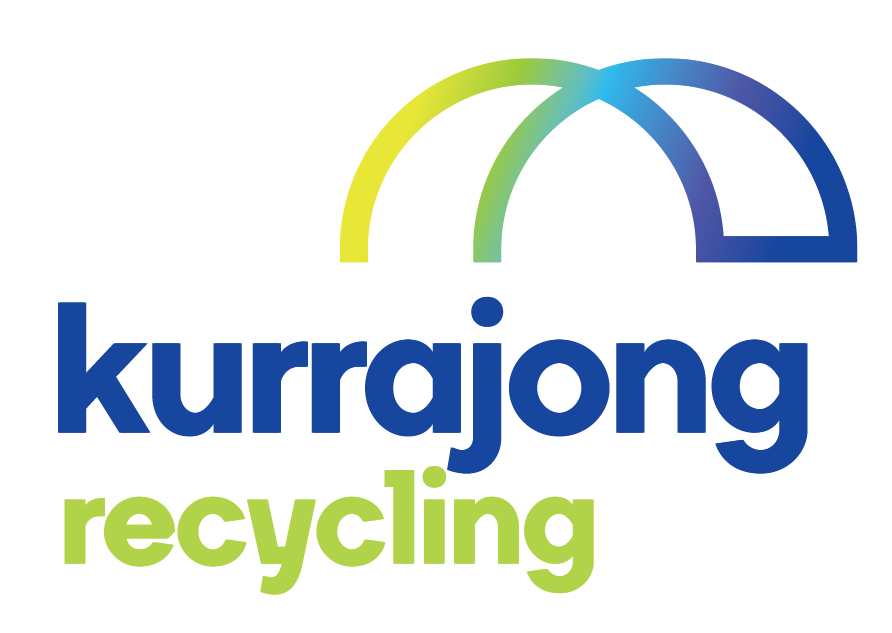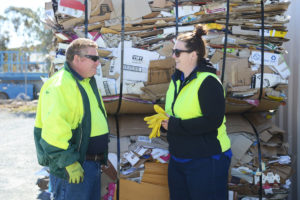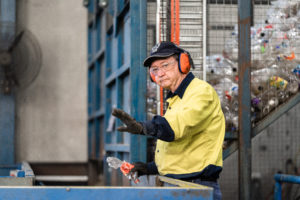Australian and international markets for recycled materials, and the quality and quantity of our materials determine where we sell your recycled materials. Australia has few manufacturing companies that can use recycled material, so much of the nation’s recycling must be sold overseas. As some of our buyers on-sell our materials, we do not know all the end-users of our products.
Our glass bottles and jars are intentionally broken during the sorting process, and some is sold to a Brisbane company to make new containers. Most of our glass is processed into crushed glass and sold to councils and businesses for road making, pipe-laying backfill, and site stabilisation around buildings or sites such as sewage-treatment works.
Victorian, NSW, Queensland and international companies buy our number 1, 2 and 5 plastics which are the most saleable plastics. These companies may process and on-sell these plastics, or make new products such as pallets, irrigation pipes; soft drink, shampoo and detergent bottles; outdoor furniture, carpet fibres, fleece jackets, fence posts, bollards, plumbing pipe fittings, and compost bins.
As Australia has no rolling mills and very few smelting facilities, companies on-sell our aluminium to South Korean and other international companies for rolling and smelting and then reuse by industry. Recycled aluminium is used to make aluminium cans, automotive engines, window and door frames, saucepans and other homewares.
Our steel cans are purchased by a company in Albury that on-sells to foundries in Australia, NZ, Asia and India. We also sell to an international company that distributes steel to their Australian steel mills and international customers. A local metal business is the sole buyer for all our steel scrap metal. Steel is recycled into new steel cans, cars, construction steel, aeroplanes and train tracks. Steel and aluminium can be recycled indefinitely unlike recycled plastics, paper and cardboard.
Currently, three companies buy our bales of cardboard for pulping and remanufacture into new products. These materials are processed locally and abroad and used in manufacturing cardboard boxes, paper bags, egg cartons, cereal boxes, newspaper, toilet rolls and kitty litter. The layers of paper used in its construction make cardboard more durable than paper.
We process paper into bales of shredded (from our document destruction service) and un-shredded paper, mixed-colour paper or white paper. Our paper is purchased and processed by a number of Australian and international companies. Some shredded paper is sold locally for packaging and animal bedding. Paper and cardboard are recycled into similar products such as cardboard boxes, fruit and egg cartons, cereal boxes, newspaper, toilet rolls, insulation, kitty litter, and small animal bedding and litter.
E-waste contains large amounts of plastic, metals and precious metals including gold, silver, platinum, nickel, zinc, aluminium and copper. Most of our disassembled e-waste is taken to Melbourne. The cabling, circuit boards, glass, metals and plastics are then processed or on-sold as raw materials for making new products in Australia and overseas. Our dismantled Perspex TV and computer screens are used by a Wagga Wagga business.
Hopefully, Australia will support the growth of local industries and ‘close the resource loop’ within our country and reduce our dependency on overseas markets. But until then, the economic viability of Australia’s recycling industry depends on being able to sell into both Australian and international markets.


